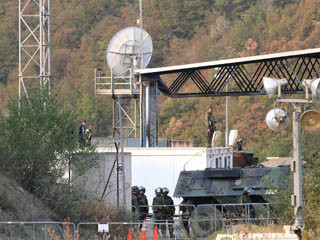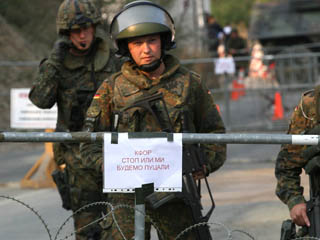September 16, 2011
As Kosovo customs and EU police follow through with plan to take control of borders with Serbia, local Serbs are strengthening roadblocks but not otherwise creating disturbances.
Belgrade, Pristina
|
||
| Jarinje border crossing on Friday morning | Photo by Zoran Kosanovic |
Serb-run Northern Kosovo was calm on Friday following the hotly contested reported deployment of a handful of Kosovo customs officials and EU police on two disputed border crossings.
Kosovo customs staff and EULEX police arrived by helicopter at the two crossings around 8am. Earlier on Friday there were questions about whether the helicopters had transported only EU police to the crossings.
But later on Friday Kosovo’s Interior Minister, Bajram Rexhepi, told Serbia's Tanjug news agency that Kosovo police and customs officials definitely were present on the border, along with EU police. He did not give an exact number, however.
Local Serbs opposed to the deployment of officials from the Albanian-led government have blocked roads and the main bridge over the Ibar in the divided northern town of Mitrovica all week.
Yesterday those barricades were in place and being strengthened in some areas but there was no immediate sign of the long-feared armed clashes at the crossings.
At the Brnjak crossing, Serbs have fortified a five-metre-high barricade near the crossing, which they had created by dumping masses of soil onto the road.
Serbia’s government said the situation in Northern Kosovo was under control and it called on locals to protest peacefully and not fall for provocations.
Fears of clashes rose on Thursday following reports that nationalist extremists from Serbia alongside "a thousand" police from Serbia had entered the enclave to boost the hand of locals resisting the deployment of the Kosovo customs officials.
The head of the Serbian Orthodox Church, Patriarch Irinej, also arrived in Mitrovica on Thursday and held a church service on Friday in another show of symbolic support for the Serb protesters.
According to the Kosovo government plan, which Prime Minister Hashim Thaci confirmed on Wednesday, Kosovo customs officials and EU border police would be present at Jarinje to control non-commercial vehicles.
Vehicles carrying commercial goods without excise will be processed at Brnjak while vehicles with goods for excise, such as alcohol and tobacco, were to cross through Merdare, which is in the east of Kosovo.
Thaci said that Kosovo's authorities would have overall authority at the crossings but would be supervised by EU rule-of-law, EULEX, police.
The plan was designed to dovetail with the implementation of a recent EU-mediated agreement on custom stamps and the free movement of goods between Kosovo and Serbia.
This appeared to be going according to plan on Friday, following reports that Serbian vehicles were now entering Kosovo at the Merdare crossing. Their entry suggested that Kosovo was making good on a pledge to scrap a blockade on goods entering from Serbia imposed in retaliation to a similar blockade from Serbia.
Tensions between Kosovo and Serbia mounted in late July when Kosovo Police unilaterally tried to seize control of the two border crossings at Jarinje and Brnjak, which NATO's KFOR troops had controlled since Kosovo declared independence in 2008.
 |
| Jarinje border crossing |
But local Serbs do not want officials from the Albanian-led government in Pristina positioned on the border between their enclave and Serbia, and they reacted to the July police raid by torching the crossing at Jarinje and blocking roads in the north.
The tensions in the north of Kosovo were discussed on Thursday night at a United Nations Security Council session in New York.
The UN urged Belgrade and Pristina to avoid actions that could exacerbate tensions in northern Kosovo as EU and Kosovo officials took over the border gates.
Western diplomats at the session said the 15-nation body was unlikely to take any action.
Earlier, Anders Fogh Rasmussen, NATO Secretary General, said that international KFOR peacekeepers would react if peace and security are threatened, but did not specify what the reaction might be.
KFOR said it had intensified security measures at Jarinje.
Rasmussen called on all people in Kosovo to continue dialogue and stressed that unilateral moves by either side will not be useful.
Speaking at a Belgrade security forum on Thursday, Serbian President Boris Tadic expressed "grave concern" about Kosovo's move to impose controls on the northern border.
“The unilateral... attempt of Pristina with EULEX to impose customs control on the administrative line in north Kosovo will seriously endanger the peace and stability of the whole region," he said.
"This solution has not been agreed between Belgrade and Pristina and therefore it must be prevented,” Tadic added.

